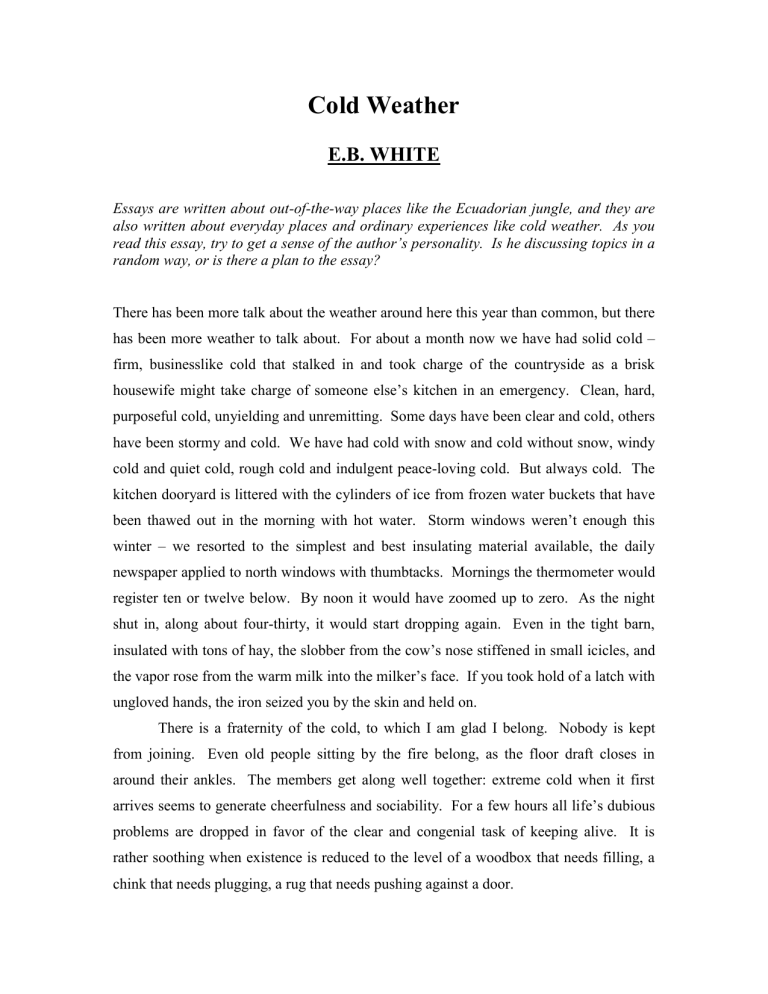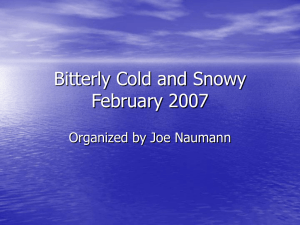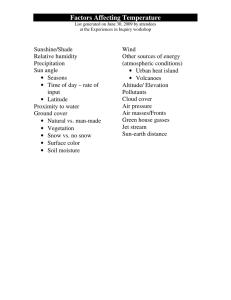
Cold Weather E.B. WHITE Essays are written about out-of-the-way places like the Ecuadorian jungle, and they are also written about everyday places and ordinary experiences like cold weather. As you read this essay, try to get a sense of the author’s personality. Is he discussing topics in a random way, or is there a plan to the essay? There has been more talk about the weather around here this year than common, but there has been more weather to talk about. For about a month now we have had solid cold – firm, businesslike cold that stalked in and took charge of the countryside as a brisk housewife might take charge of someone else’s kitchen in an emergency. Clean, hard, purposeful cold, unyielding and unremitting. Some days have been clear and cold, others have been stormy and cold. We have had cold with snow and cold without snow, windy cold and quiet cold, rough cold and indulgent peace-loving cold. But always cold. The kitchen dooryard is littered with the cylinders of ice from frozen water buckets that have been thawed out in the morning with hot water. Storm windows weren’t enough this winter – we resorted to the simplest and best insulating material available, the daily newspaper applied to north windows with thumbtacks. Mornings the thermometer would register ten or twelve below. By noon it would have zoomed up to zero. As the night shut in, along about four-thirty, it would start dropping again. Even in the tight barn, insulated with tons of hay, the slobber from the cow’s nose stiffened in small icicles, and the vapor rose from the warm milk into the milker’s face. If you took hold of a latch with ungloved hands, the iron seized you by the skin and held on. There is a fraternity of the cold, to which I am glad I belong. Nobody is kept from joining. Even old people sitting by the fire belong, as the floor draft closes in around their ankles. The members get along well together: extreme cold when it first arrives seems to generate cheerfulness and sociability. For a few hours all life’s dubious problems are dropped in favor of the clear and congenial task of keeping alive. It is rather soothing when existence is reduced to the level of a woodbox that needs filling, a chink that needs plugging, a rug that needs pushing against a door. I remember that first morning. It was twelve below just before daylight. Most of us had realized the previous afternoon that we were in for a cold night. There is something about the way things look that tells you of approaching cold – a tightening, a drawing in. Acting on this tip, I had laid a fire in the cold drum stove in the garage, a few feet from the car’s radiator. Before I went to bed I lit it and threw in another stick of wood. Then I went down to the sheep shed, whose door ordinarily stands open night and day, winter and summer, and kicked the snow away with my boot and closed the door. Then I handed the cow a forkful of straw instead of her usual teaspoonful of sawdust, and also threw some straw down through the hatch to the hog. (The windows in this house have to be propped up with a window stick, and on nights like this we don’t use the window stick; we just take a piece of stove wood and lay it flat on the sill and let the window down on that.) Morning comes and bed is a vise from which it is almost impossible to get free. Once up, things seem very fine and there are fires to be made all over the house, and the old dog has to be wrapped in a wool throw because of his rheumatism. (He and I have about the same amount of this trouble, but he makes more fuss about it than I do and is always thinking about wool throws.) Then everybody compares notes, each reads the thermometer for himself, and wonders whether the car will start. From the gray waters of the bay the vapor rises. In the old days when the vapor used to rise from the sea people would wink and say: “Farmer Jones is scalding his hog.” The phone jingles. It’s the mailman. He can’t start his car. I’m to pick him up if my car will start and carry him to the town line. The phone rings again (cold weather stirs up the telephone). It’s Mrs. Dow. I am to pick her up on my way back from the store because it’s most too cold to walk in this morning. Thanks to my all-night fire in the drum stove my car starts easily, third time over. The garage is still comfortably warm from the night before and there are embers in the stove. The question of clothes becomes a topic for everybody. The small boy, who has relied thus far on a hunting cap with flaps down, digs up an old stocking cap as midwinter gear. I exhume my Army underdrawers, saved from the little war of 1918. The snow squeaks under the rubber tread of the boot, and the windows of the car frost up immediately. The geese, emerging from their hole in the barn, trample a yard for themselves in the deep drift. They complain loudly about a frozen water pan, and their cornmeal mash is golden-yellow against the blue snow. The mailman is full of charitable explanations about his car – he thinks it was sediment in the carburetor. The general cheerfulness is in part surprise at discovering that it is entirely possible to exist in conditions that would appear, offhand, to be fatal. The cold hasn’t a chance really against our club, against our walls, our wool, the blaze in the stove, the clever mitten, the harsh sock, the sound of kindling, the hot drink, the bright shirt that matches the bright cap. A truck driver, through the slit in his frosted windshield, grins at me and I grin back through the slit in mine. This interchange, translated means: “Some cold, Bud, but nothing but what your buggy and my buggy can handle.” Word gets round that the school bus won’t start. Children wait, chilly but busy, along the route, testing surfaces for skis and runners, some of them waiting indoors and peering out the windows. A truckman has to go down and tow the bus to get it started. Scholars will be tardy today. This makes them cheerful. It is a fine thing to be late for school all together in one vast company of mass delinquency, with plenty of support and a cold bus for alibi. If a man were in any doubt as to whether it is a cold day or not, there is one way he can always tell. On a really cold day the wooden handle of a pitchfork is as cold as a pinch bar. And when he picks up a scrubbing brush to clean out a water pail the brush has turned to stone. I don’t know any object much colder than a frozen brush.

